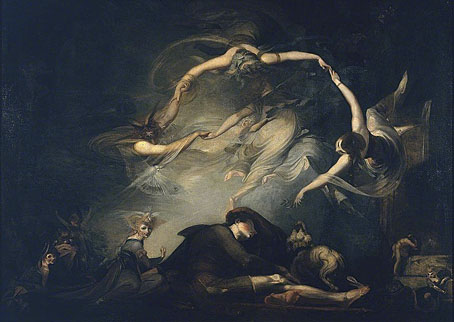The Shepherd’s Dream, from Paradise Lost (1793) by Henry Fuseli.
• “16 April. A card from Tom King with news of the tattoo of me that he had put on his arm: ‘The tattoo remains popular, though bizarrely one person thought it was of Henry Kissinger. It also makes for an amusing conversation during intercourse.’ This suggests the intercourse might be less than fervent, my name in itself something of a detumescent.” Alan Bennett‘s diary for the year is always a highlight of December.
• “I know that if I don’t write, say on holiday, I begin to feel unsettled and uneasy, as I gather people do who are not allowed to dream.” The Paris Review removed its paywall on their Art of Fiction interview with JG Ballard.
• “A biologist and composer have turned the aurora borealis into sound to create a magic melding of art and nature.”
If we let it, dreaming gradually erodes wake centrism—that waking consciousness to which Westerners in particular are inordinately attached. You might think of wake centrism as a pre-Copernican-like worldview that presumes waking to be the centre of the universe of consciousness, while relegating sleeping and dreaming to secondary, subservient positions. It is a matrix, a cultural simulation evolved to support adaptation, yet it inadvertently limits our awareness. Wake centrism is a subtle, consensual, sticky and addictive over-reliance on ordinary ways of perceiving that interfere with our direct personal experience of dreaming. To paraphrase the 16th-century British clergyman Robert Bolton, it is not merely an idea the mind possesses, but an idea that possesses the mind. Wake centrism is a flat-world consciousness. It warns us to stay away from the edges, to refrain from dialoguing with dreams and the unconscious.
Rubin Naiman on sleep and dreams
• 96th of October: an online fiction magazine dedicated to “tales of the extraordinary”.
• “Punk artist Barney Bubbles joins Manet among works given to UK public in 2020.”
• The results of the Nature Photographer of the Year contest for 2020.
• A list with a difference: Twenty Four Psychic Pop Relics by Woebot.
• Merve Emre on how Leonora Carrington feminized Surrealism.
• Mix of the week: XLR8R Podcast 675 by Teebs.
• I Had Too Much To Dream (Last Night) (1966) by The Electric Prunes | The Room Of Ancillary Dreams (2000) by Harold Budd | Blue Dream (2001) by Sussan Deyhim & Richard Horowitz

